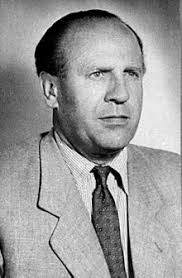November 2, 2018
Oskar Schindler: The Virtuous Nazi

Oskar Schindler, a German Industrialist, saw the outbreak of war in 1939 as an opportunity to make money. As the Nazi Army invaded Poland, Schindler took advantage of Poland’s loss by purchasing a near bankrupt factory in Krakow, that he could use to make enameled kitchenware. Taking advantage of a free labor force of Jewish people over the next few years, he amassed a fortune. 1

Having worked as a spy for Adolf Hitler, Schindler made important connections with high ranking Nazi officials. His factory, like many others in German occupied areas, exploited the labor of Jews.2 Not far from his factory in Poland was the concentration camp at Plaszow. That nearby camp was run by Amon Göth, who was known throughout the area for being ruthless and merciless. Jews, and anyone else, that were sent to his camp would almost surely die. The exact number of victims that lost their lives there is not known. However, it is estimated that 80,000 people died in Plaszow in its two-year existence.3 Having these connections with high ranking and prominent men in the Nazi Party, he was able to request to move roughly 900 Jews from this concentration camp to his factory in Krakow less than four miles away. Many of these Jews were unskilled workers, and because of this, they would not have lived long in Göth’s concentration camp. Schindler kept these Jews safe in his factory, and as one of his Jews, Moshe Bejski, a future Israeli Supreme Court Justice from 1979-91, recalled that Schindler would stay with the Jews until midnight when the Nazi soldiers would leave.4
As the Soviet Army progressively advanced its way into Poland, Schindler was forced to move his Jews to his other factory in Brunnlitz, in the Sudetenland. During the transfer, the near three hundred women, being shipped together in the same train car, were mistakenly shipped to Auschwitz. These women were being shipped in one freight train car, with little to no clothes in the middle of winter. The women and girls, many sick, old, or frostbitten, knew where they were, and that if they stayed, they would surely not make it out alive. They were forced to stay the night in the camp, many dreading the next day. Schindler, having found this out in time, personally drove to Auschwitz and bribed the Nazi officials to let him take the women back with him to his factory in the Sudetenland.5

As the Soviets marched west into Czechoslovakia, and as the war in Europe ended, it was clear to Schindler that he would need to inform his people and prepare them for life ahead. On the eighth of May, 1945, he gathered everyone onto the floor of his factory, and they listened to Winston Churchill address the world that Germany had officially surrendered. After this, he spent one last night with the near 1500 people he employed, and saved the lives of, until morning.6 He had to flee, as he could have been tried as a war criminal because he exploited the labor of hundreds, without pay. He would move many times, and in 1974 he would die. As was his request, he was, and still is buried on Mount Zion, Jerusalem. Today the people that thank Schindler for their lives, thousands in number, call themselves Schindlerjuden, or Schindler’s Jews.
- Martin Gilbert, The Righteous: The Unsung Heroes of the Holocaust (New York: Henry Holt, 2004), 224. ↵
- David Crowe, Oskar Schindler: The Untold Account of His Life, Wartime Activities, and the Truth Behind His List (New York: Westview Press, 2004), 45-50. ↵
- Salem Press Encyclopedia, 2015, s.v. “Plaszow Concentration Camp,” by Joseph Dewey. ↵
- “Moshe, Bejski,” Benjamin N. Cardoza School of Law, 2014, http://versa.cardozo.yu.edu/justices/bejski-moshe; Martin Gilbert, The Righteous: The Unsung Heroes of the Holocaust (New York: Henry Holt, 2004), 225. ↵
- David Crowe, Oskar Schindler: The Untold Account of His Life, Wartime Activities, and the Truth Behind His List (New York: Westview Press, 2004), 402. ↵
- Martin Gilbert, The Righteous: The Unsung Heroes of the Holocaust (New York: Henry Holt, 2004), 224. ↵
Tags from the story
Holocaust
Oskar Schindler